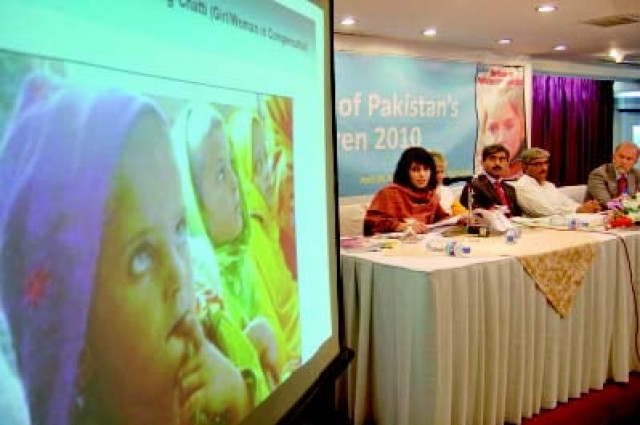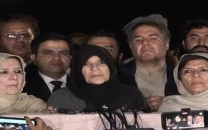Report launch: Violations of child rights remain widespread
Militancy claimed lives of 92 children in 2010, according to SPARC’s annual report.

One of the government’s primary responsibilities is to protect the welfare of its most vulnerable citizens, namely, children. Unfortunately, 2010 witnessed the deaths of 92 and serious injuries of 118 more at the hands of militancy. By September 2010, over 2.5 million children under the age of five were at serious risk of starvation. Violence against children remained widespread at homes, streets and, regrettably, at the institutes of the criminal justice system.
About 187 children committed suicide while another 80 attempted suicide in the same year.
These facts were revealed at the launch of the annual report of the Society for the Protection of the Rights of the Child (SPARC). Titled ‘The State of Pakistan’s Children 2010’, the report was launched on Thursday at a local hotel.
According to the report, the plight of our children continues to remain dire as the rights of children are continually violated, against only a few positive developments. Poverty-induced desperation led some parents to offer their children for sale and others to commit suicide after killing their children.
Moreover, the year remained especially tough for children as the floods added complex challenges of conflict, terrorism, the abysmal state of health and education sectors, and lack of legislative initiatives combined with poor implementation of existing law. Out of the six million children affected by the floods, around 3.5 million remain at risk, with imminent repercussion on their nutritional status.
Quoting media reports, the report reveals that around 210 children were affected mainly by suicide attacks, bomb blasts, landmines and hand grenade attacks. Furthermore, militants deprived thousands of children from their basic rights to education by completely destroying around 126 public schools.
Whatever progress was made towards introducing new laws for the protection of children, it was rolled back with the 18th constitutional amendments that resulted in stalling major legislative initiatives of the past years.
Speaking on the occasion, SPARC Executive Director Arshad Mahmood said no concrete steps have been taken for the implementation of the Concluding Observations and Recommendations (CO&Rs) made by the UN Committee on the Rights of the Child in consideration of the last periodic report submitted to the Committee by Pakistan.
He lamented the fact that the Frontier Crimes Regulation is still a reality in FATA despite the acknowledgment of its draconian nature in the inaugural speeches of the president and prime minister in 2008. Numerous people, including women and children, continue to be imprisoned under the regulation’s collective responsibility clause.
“Political will is the key to improve the plight of children on a sustainable basis,” he added.
SPARC Research Officer Amina Sarwar lauded the government of Khyber-Pakhtunkhwa (K-P) for propagating the K-P Child Protection and Welfare Act 2010 in September. “In the education and health sectors, Pakistan remains far from achieving the Education For All and Millenium Development Goals objectives,” she added.
Ethnomedia Executive Director Samar Minallah said the police have begun to play a responsible role in arresting culprits especially in K-P. She added that a 2004 amendment in the Pakistan Penal Code, which is now Section 310A, covers the exchange of girls as compensation and lays down a 3 to 10 year imprisonment for violators of the section.
Parliamentarian Bushra Gohar called the 18th Amendment a “ray of hope” for Balochistan. Deputy Head of Mission from the Royal Norwegian Embassy, Terje Barstad, said Pakistan had a long way to go in the implementation of the recommendations made by the UN Committee on the Rights of the Child. Health care also remains to be prioritised.
Published in The Express Tribune, April 29th, 2011.



















COMMENTS
Comments are moderated and generally will be posted if they are on-topic and not abusive.
For more information, please see our Comments FAQ